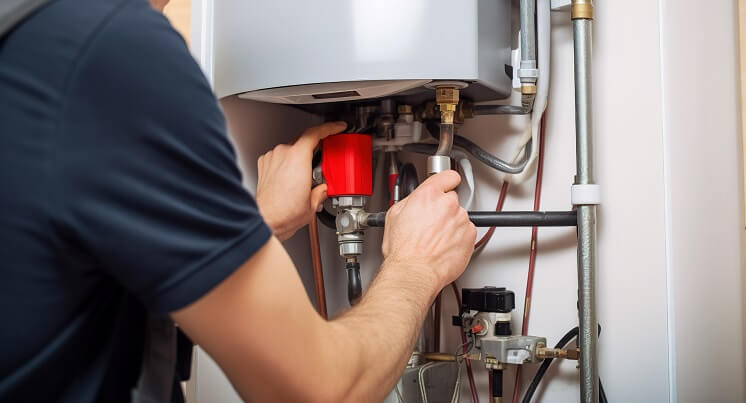We have noticed the article involving Water Heaters Problems directly below on the net and felt it made sense to relate it with you on my blog.

Imagine beginning your day without your routine warm shower. That currently sets an inadequate tone for the rest of your day.
Every house requires a reliable hot water heater, but just a few recognize just how to take care of one. One easy method to maintain your water heater in top form is to look for mistakes routinely as well as repair them as quickly as they show up.
Bear in mind to turn off your water heater before sniffing around for faults. These are the water heater mistakes you are most likely to run into.
Water also warm or as well chilly
Every water heater has a thermostat that figures out exactly how hot the water gets. If the water coming into your house is too warm regardless of establishing a practical maximum temperature level, your thermostat could be defective.
On the other hand, too cold water might be due to a fallen short thermostat, a broken circuit, or improper gas flow. For example, if you make use of a gas hot water heater with a damaged pilot burner, you would get cold water, even if the thermostat remains in perfect condition. For electrical heating systems, a blown fuse may be the culprit.
Not nearly enough hot water
Water heaters can be found in numerous dimensions, depending upon your warm water needs. If you lack hot water before everybody has had a bathroom, your hot water heater is also tiny for your family size. You need to take into consideration mounting a bigger hot water heater storage tank or selecting a tankless water heater, which uses up less space and also is a lot more sturdy.
Weird noises
There are at the very least five kinds of sounds you can hear from a hot water heater, however the most typical interpretation is that it's time for the water heater to retire.
First of all, you should be familiar with the typical appears a water heater makes. An electrical heating system might seem various from a gas-powered one.
Standing out or banging sounds generally suggest there is a piece of sediment in your tanks, as well as it's time to clean it out. On the other hand, whistling or hissing noises might merely be your valves allowing some stress off.
Water leaks
Leaks can come from pipes, water connections, shutoffs, or in the worst-case circumstance, the container itself. With time, water will certainly rust the storage tank, and also discover its escape. If this occurs, you need to change your water heater immediately.
Nevertheless, prior to your adjustment your entire storage tank, make sure that all pipelines are in location and that each valve functions flawlessly. If you still require help identifying a leak, call your plumber.
Rust-colored water
Rust-colored water implies one of your water heater components is worn away. Maybe the anode pole, or the container itself. Your plumber will be able to identify which it is.
Warm water
Regardless of exactly how high you set the thermostat, you will not get any kind of warm water out of a heating system well past its prime. A water heater's efficiency might reduce with time.
You will certainly also obtain warm water if your pipes have a cross link. This means that when you turn on a tap, warm water from the heater flows in together with regular, cold water. A cross link is easy to place. If your warm water taps still run after shutting the hot water heater shutoffs, you have a cross link.
Discoloured Water
Rust is a major root cause of dirty or discoloured water. Deterioration within the water tank or a stopping working anode pole could create this discolouration. The anode pole shields the tank from rusting on the inside and should be checked annual. Without a pole or a properly operating anode rod, the hot water quickly wears away inside the storage tank. Contact a specialist water heater professional to establish if changing the anode pole will fix the issue; if not, change your hot water heater.
Conclusion
Preferably, your hot water heater can last ten years before you require a change. Nevertheless, after the 10-year mark, you may experience any one of these mistakes a lot more frequently. At this point, you should include a new water heater to your spending plan.
How To Troubleshoot 3 Common Water Heater Problems in Twin Cities
The Water Heater Is Leaking
A leaky cold water inlet valve A loose pipe fitting A leaky temperature and pressure relief valve A corroded anode rod A cracked tank Turn Off Your Water Heater:
Shut off your gas water heater by turning the gas valve on the unit to the “OFF” position. Shut off your electric water by switching its power off at your electrical panel. Look for a two-pole breaker labeled “water heater” and turn it to the “OFF” position. Move the ball valve connected to the water heater to be perpendicular to the piping at a 90° angle. Look for the Leak:
Depending on whether the water is coming from the tank's top or bottom, you’ll want to look for the leak in different locations.
If the leak comes from the top of the tank, carefully look for water escaping from the cold water inlet valve or loose pipe fittings. Rusted hot and cold water valves can have loose connections with the tank, with water leaking out of them.
https://mspplumbingheatingair.com/blog/how-to-troubleshoot-3-common-water-heater-problems
Hopefully you liked our excerpt about Water Heaters Problems. Thanks for taking a few minutes to read our posting. Loved our article? Please share it. Help another person discover it. Bless you for your time. Kindly check up our website back soon.
Book